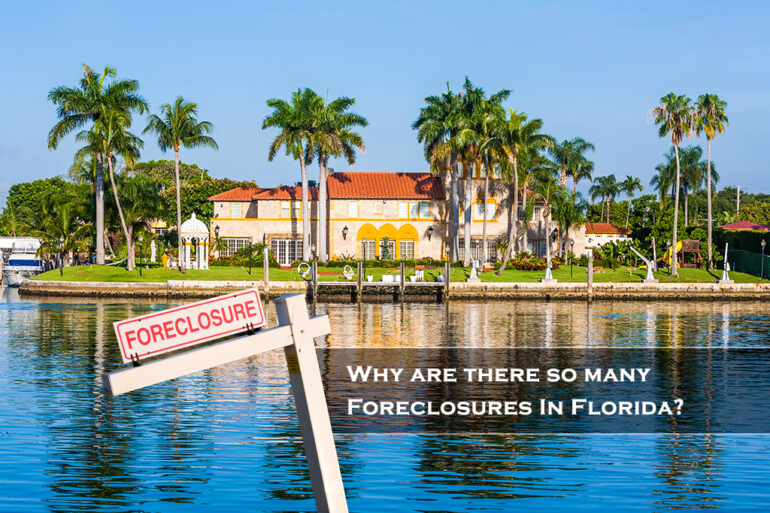Why Are There So Many Foreclosures In Florida?
Investors are always on the hunt for a hot market overflowing with opportunities to turn a profit on foreclosures. Over the last several decades, those who have been paying attention to economic and real estate trends have noticed that Florida is consistently among the states with the highest rates of foreclosures.
But why are foreclosures in Florida so prevalent?
Florida, similar to Nevada and California, is vulnerable to certain conditions that play a major role in making its real estate market turbulent.
In this slice of the PropertyOnion.com blog, we’re revealing the reasons behind the historically massive number of foreclosures in Florida.
Florida Lives and Breathes Tourism
Obviously, Florida is a major tourism state with millions of people from around the globe traveling to it every year.
From the beaches and Everglades to the spectacular theme parks and historical cities like St. Augustine, the entire state relies on the revenue generated by global tourism.
Just like with any economy that is based around tourism, when the flood of visitors turns to a trickle, the economy begins to falter. In some Florida cities, the majority of full-time residents and homeowners are employed by tourism in some way, whether it be in hospitality or another related industry.
So when people stop visiting, residents begin to starve for income.
If you pay attention to past trends, you will see that in parts of Florida where tourism slows (for any reason), the local economy and its full-time residents begin to suffer. The local rate of foreclosures is proof.
Tropical Storms and Hurricanes Threaten Underinsured Floridians’ Financial Security
As we know, Florida gets hit by more than its fair share of hurricanes, tornadoes, and tropical storms. Without having enough savings or insurance to protect your home and belongings in the case of damage, you could be devastated by a single storm.
It is not uncommon for families that are living paycheck to paycheck to become financially derailed as a result of damage from a storm. They can easily end up without shelter, lose time from work, and be on the hook for repairing damages caused to their home.
Most Florida property insurance hurricane deductibles are 5 to 10 percent. If someone is trying to save money on these policies (costs have been jumping 20% per year recently), they will likely select the less expensive 10% deductible without considering the repercussions. If their property has major damage from the storm and requires $100,000 in repairs, that homeowner is now on the hook for $10,000, a price tag seemingly out of reach for many middle-class homeowners.
Some of these homeowners simply stop paying their mortgage to pay for the damage repairs, or worse, they walk away from the damaged home and allow it to fall into foreclosure.
It is also possible for Florida homeowners to lose work when their place of employment or their own business becomes damaged during these storms. Some people lose both their homes and their source of income at the same time.
As a result, these storms lead many Florida homeowners down the path of foreclosure.
Florida Is the Most Popular State for Second and Third Homes
According to the National Association of Home Builders (NAHB), Florida has the largest number of second and third homes, making it the vacation home capital of the country. The rich love the Sunshine State and, thanks to COVID-19, the popularity seems to be growing quickly.
Historically, data also shows that when money gets tight for these second and third homeowners, the first payment they skip is on their secondary homes. The financially stressed will always protect their first and primary homes, which they live in.
NAHB estimates that, as of 2018, 1.1 million homes in Florida are second and third homes. These properties are particularly vulnerable to becoming distressed due to delinquent mortgages, property taxes, code violations, and other upkeep issues.
The Pandemic Sparks Spike in Florida Foreclosures
Just like in many states, the pandemic made it impossible or nearly impossible for renters to afford their housing payments. As a result, many financially unprepared landlords found themselves unable to pay their mortgage or their own bills associated with the property.
When the government placed a moratorium on evictions, things for landlords and real estate investors became even more hairy. In some cases, tenants were home more and consuming more utilities like electricity, and that financial burden became more than some investors could take.
Not only were landlords’ hands tied, but if utilities were included with the lease and already in the landlords’ name, they were forced to continue paying those rising bills with no income to help them. After just a couple of months of this, thousands of landlords fell behind on their mortgage payments.
The Rise in Florida Foreclosures Started Before the Pandemic
Although the pandemic played a major role in the rise in the number of foreclosed properties in Florida, there was already a looming problem. Economists and the media were already reporting a spike in foreclosures back in the summer of 2019.
In most cases, the pre-pandemic spike in foreclosures was attributed to similar issues we saw with the housing crash of 2008. People were buying homes that they could just barely afford. Then an increase in property taxes, HOA fees, or insurance rates became more of a financial burden than homeowners could handle.
In many situations, the homeowner had also been forced to take out a second mortgage just to pay their bills, and when those increased rates kicked in, they were already too deep in the hole.
During a seller’s market this isn’t as bad because you may be able to sell the house for far more than you paid and start getting out of debt, but that isn’t the norm. Many people find themselves in financial trouble during a buyer’s market, forcing them to sell for less or close to what they paid.
While the pandemic played a role in recent and current foreclosures, there was a pre-existing condition in Florida already. Many investors were already trying to buy foreclosures back then.
What Is the Trend Now with Foreclosure Auctions in Florida?
Although right now the foreclosure inventory is at a historically “normal” level, with the typical number of properties being sold at auctions each month, this inventory is set to explode with the backlog of foreclosure cases the banks have not been filing due to COVID-19. Most banks have stated they will begin working these pandemic backlogs in the coming months. This will surely create opportunity and some balance in this crazy market.
At this point, it is only natural for you to be wondering whether you should start exploring Florida foreclosures and tax deed auctions. But before you buy foreclosures in Florida, or anywhere, you need to do all of the required due diligence about the property and immediate local economy.
Just like with any financial investment, real estate has inherent pros and cons.
For example, you could purchase a foreclosure at auction without getting to inspect the property. Although you might score a great deal, when you get there it could be a disaster of a property that blows your entire investment budget. Or even worse, you could experience title issues because you didn’t properly research using a title search service like ours.
Always remember that one investment can make or break you. You owe it to yourself to tip the odds in your favor by getting prepared before you attempt any new real estate investment strategy.
Our mission here at PropertyOnion.com is to empower you with all of the education and tools you need to make savvy real estate investments that allow you to live the life you want. Please continue to explore our resources and arm yourself with knowledge. When the moratoriums all expire, you want to be ready to invest and lock in your profits.








